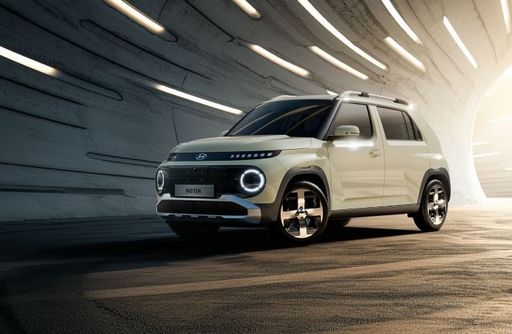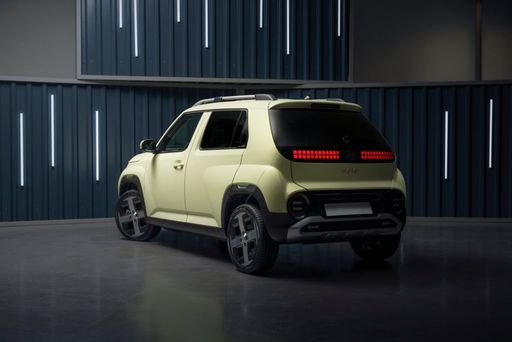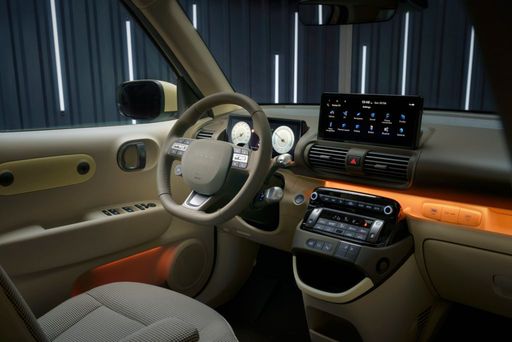Toyota Yaris vs Hyundai Inster - Differences and prices compared
Compare performance (280 HP vs 115 HP), boot space and price (21900 £ vs 20500 £ ) at a glance. Find out which car is the better choice for you – Toyota Yaris or Hyundai Inster?
Costs and Efficiency:
Looking at overall running costs, both models reveal some interesting differences in everyday economy.
Hyundai Inster has a barely noticeable advantage in terms of price – it starts at 20500 £ , while the Toyota Yaris costs 21900 £ . That’s a price difference of around 1372 £.
Engine and Performance:
Under the bonnet, it becomes clear which model is tuned for sportiness and which one takes the lead when you hit the accelerator.
When it comes to engine power, the Toyota Yaris has a decisively edge – offering 280 HP compared to 115 HP. That’s roughly 165 HP more horsepower.
In acceleration from 0 to 100 km/h, the Toyota Yaris is convincingly quicker – completing the sprint in 5.50 s, while the Hyundai Inster takes 10.60 s. That’s about 5.10 s faster.
There’s also a difference in torque: Toyota Yaris pulls decisively stronger with 390 Nm compared to 147 Nm. That’s about 243 Nm difference.
Space and Everyday Use:
Whether family car or daily driver – which one offers more room, flexibility and comfort?
Seats: Toyota Yaris offers to a small extent more seating capacity – 5 vs 4.
In curb weight, Toyota Yaris is noticeable lighter – 1090 kg compared to 1380 kg. The difference is around 290 kg.
In terms of boot space, the Toyota Yaris offers minimal more room – 286 L compared to 280 L. That’s a difference of about 6 L.
When it comes to payload, Toyota Yaris noticeable takes the win – 525 kg compared to 357 kg. That’s a difference of about 168 kg.
Who wins the race in the data check?
The Toyota Yaris is decisively ahead in the objective data comparison.
This result only shows which model scores more points on paper – not which of the two cars feels right for you.
Costs and Consumption
View detailed analysis
Engine and Performance
View detailed analysis
Dimensions and Body
View detailed analysis

Toyota Yaris
Toyota Yaris
The Toyota Yaris is a sprightly city hatch that packs clever packaging, surprising comfort and fuel-sipping manners into a neat, easy-to-park package. It rewards sensible buyers with low running costs, friendly ergonomics and a forgiving drive, delivered with Japanese reliability and just enough personality to make errands feel a little less ordinary.
details

Hyundai Inster
The Inster has quickly captured the attention of automotive enthusiasts with its striking design and dynamic performance. This model seamlessly blends advanced technology with comfort, making it an ideal choice for both daily commutes and adventurous road trips. With its spacious interior and innovative features, the Inster promises an exhilarating driving experience that doesn’t compromise on practicality.
details


Costs and Consumption |
|
|---|---|
|
Price
21900 - 46700 £
|
Price
20500 - 25800 £
|
|
Consumption L/100km
3.8 - 9.5 L
|
Consumption L/100km
-
|
|
Consumption kWh/100km
-
|
Consumption kWh/100km
14.3 - 15.1 kWh
|
|
Electric Range
-
|
Electric Range
327 - 370 km
|
|
Battery Capacity
-
|
Battery Capacity
-
|
|
co2
87 - 215 g/km
|
co2
0 g/km
|
|
Fuel tank capacity
36 - 50 L
|
Fuel tank capacity
-
|
Dimensions and Body |
|
|---|---|
|
Body Type
Hatchback
|
Body Type
SUV
|
|
Seats
4 - 5
|
Seats
4
|
|
Doors
3 - 5
|
Doors
-
|
|
Curb weight
1090 - 1356 kg
|
Curb weight
1380 - 1433 kg
|
|
Trunk capacity
141 - 286 L
|
Trunk capacity
238 - 280 L
|
|
Length
3940 - 3995 mm
|
Length
-
|
|
Width
1745 - 1805 mm
|
Width
1610 mm
|
|
Height
1455 - 1500 mm
|
Height
-
|
|
Max trunk capacity
935 L
|
Max trunk capacity
-
|
|
Payload
289 - 525 kg
|
Payload
317 - 357 kg
|
Engine and Performance |
|
|---|---|
|
Engine Type
Full Hybrid, Petrol
|
Engine Type
Electric
|
|
Transmission
Automatic, Manuel
|
Transmission
Automatic
|
|
Transmission Detail
CVT, Manual Gearbox, Automatic Gearbox
|
Transmission Detail
Reduction Gearbox
|
|
Drive Type
Front-Wheel Drive, All-Wheel Drive
|
Drive Type
Front-Wheel Drive
|
|
Power HP
116 - 280 HP
|
Power HP
97 - 115 HP
|
|
Acceleration 0-100km/h
5.5 - 9.7 s
|
Acceleration 0-100km/h
10.6 - 11.7 s
|
|
Max Speed
175 - 230 km/h
|
Max Speed
-
|
|
Torque
390 Nm
|
Torque
147 Nm
|
|
Number of Cylinders
3
|
Number of Cylinders
-
|
|
Power kW
85 - 206 kW
|
Power kW
71 - 85 kW
|
|
Engine capacity
1490 - 1618 cm3
|
Engine capacity
-
|
General |
|
|---|---|
|
Model Year
2024 - 2025
|
Model Year
2025
|
|
CO2 Efficiency Class
B, G
|
CO2 Efficiency Class
A
|
|
Brand
Toyota
|
Brand
Hyundai
|
Is the Toyota Yaris offered with different drivetrains?
The Toyota Yaris is offered with Front-Wheel Drive or All-Wheel Drive.
